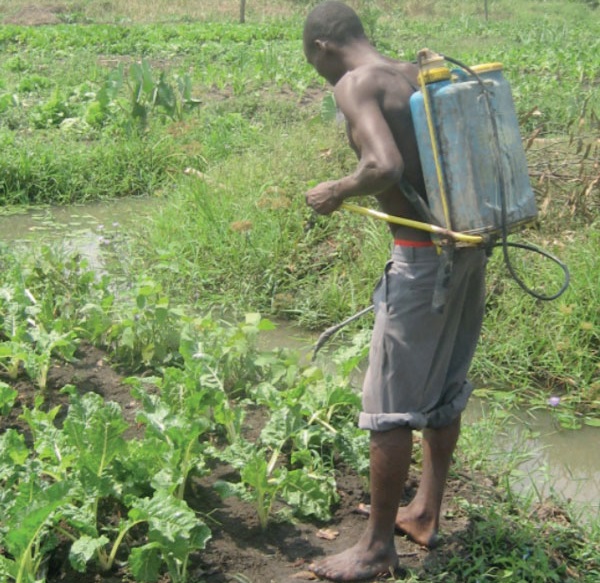
Kampala, Uganda | THE INDEPENDENT | Experts and the civil society have challenged Professor Maurice Ogenga Latigo over his comments supporting the use of agricultural chemical inputs, and called for a ban on those that have been banned in other countries.
In an opinion published in the Daily Monitor on December 31, 2024, the Professor of Agriculture and former Leader of Opposition in Uganda’s parliament, trashed the fight against “harmful and hazardous” pesticides and herbicides by the civil society and other scientists as alarmist and full of falsehoods.
This also comes as the African leaders are due to meet in Kampala over the Extra-Ordinary Summit on Comprehensive Africa Agriculture Development Programmes (CAADP) later this week.
Quoting several research findings by expert panels and UN Agencies, they said hazardous chemical inputs were costing Africa and Uganda in particular billions of dollars in terms of importation, but also in losses of harvest and treatment of health effects, on top of lives lost to related illnesses.
Dr Olupot Giregon from Makerere University College of Agriculture and Environmental Science said what is alarming about the chemicals is that the ingredients used today in pesticides and herbicides were adopted from war materials immediately after the Second World War.
Prior to that, he says, the agriculture inputs were made from inorganic materials which were not harmful, until the scientists then discovered synthetic technology which is now responsible for several health issues.
Olupot’s suggestion is that there should be intensified efforts to promote agro-ecology where the use of nature is prioritized in maintaining the best environment for agriculture, instead of using pesticides and other chemicals, as it was before.
However, he warns that this will not be easy because the multinational chemical industry will fight back.
The effects of chemical use by farmers are being made worse by the illiteracy of farmers, who use them to the detriment of the farm activities, especially making pests and unwanted herbs resistant.
The farmers then opt for mixing different chemicals to try defeat the pests.
However, Dr Olupot says even the chemical manufactures are now mixing different ingredients and giving them different names, which also makes it difficult for anyone to tell whether they are using dangerous chemicals like the dreaded glyphosate.
Quoting a report by the UN Children’s Fund (UNICEF), the activists says pregnant women and breastfeeding mothers and children under the age of five are the most-at-risk group from the environmental and food contamination by agro chemicals.
In banning some of the pesticides, the European Environment Agency says pesticides are “intrinsically harmful to living organisms, impacting ecosystems even when they are intended to exclusively target a specific pest”.
In a joint statement read by SEATINI Uganda Chief Executive Officer, Jane Nalunga, the CSOs say Uganda spends at least 75 million dollars per year as of 2022 on imports, double from the amounts spent in 2010, yet the majority of the 115 active ingredients registered by the government agencies are categorized as highly hazardous.
The other organisations in the protest statement are Pelum (Participatory Ecological Land-Use Management) Uganda; CARITAS Uganda, Food Rights Alliance; Gender, Environment and Development Action; Alliance for Food Sovereignty in Africa; CONSENT and East and Southern Africa Small Scale Farmers Forum Uganda.
By July 2023, 65 percent of the 55 flagged active ingredients registered for use in Uganda, and yet considered as highly hazardous pesticides, were not approved for use in the European Union-exporting countries.
The experts wondered why the countries manufacture the chemicals and ban their use in the sectors, but export them to Uganda and other African countries.
Unfortunately, for Uganda, 40 percent of agro chemicals are counterfeits, causing losses to the farmers and the economy. On top of that in 2020, the country lost 60 million dollars in export earnings because the export markets deemed it that they had violated the residue chemical limits.
David Kabanda, a human rights lawyer and director Center for Food and Adequate Living Rights (CEFROHT), called for prosecution of people who are opposed to the control on agro chemicals and a ban on the hazardous inputs.
While calling for more specific laws, he wondered why the existing ones like the National Organic Agriculture Policy have not been implemented fully.
Kabanda says that while it is bad enough to spray ready-to-consume foods with chemicals, in Uganda, it is banned chemicals like mancozeb.
In 2020, the European Commission issued a regulation (EU 2020/2087) refusing to renew the substance’s approval, largely based on concerns about its classification as toxic to reproduction.
However, an appeal succeeded on grounds that the ban had been based on old data.
The statement recommends that the Agricultural Chemicals Control Board expedite its work and profile all the agro chemicals on the Ugandan market and their sources; government bans importation of highly hazardous pesticides; strengthen regulation, management, use, handling, storage and trade of agro chemicals in Uganda, and strengthen research and innovation in agro ecology.
They also want the government to fast-track the development and completion of the National Agroecology Strategy; and enhance domestic resource allocation for research and innovation specifically for integrated pest management and agroecology.
****
URN
 The Independent Uganda: You get the Truth we Pay the Price
The Independent Uganda: You get the Truth we Pay the Price



